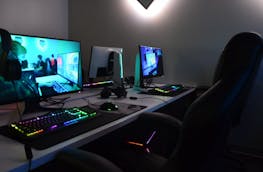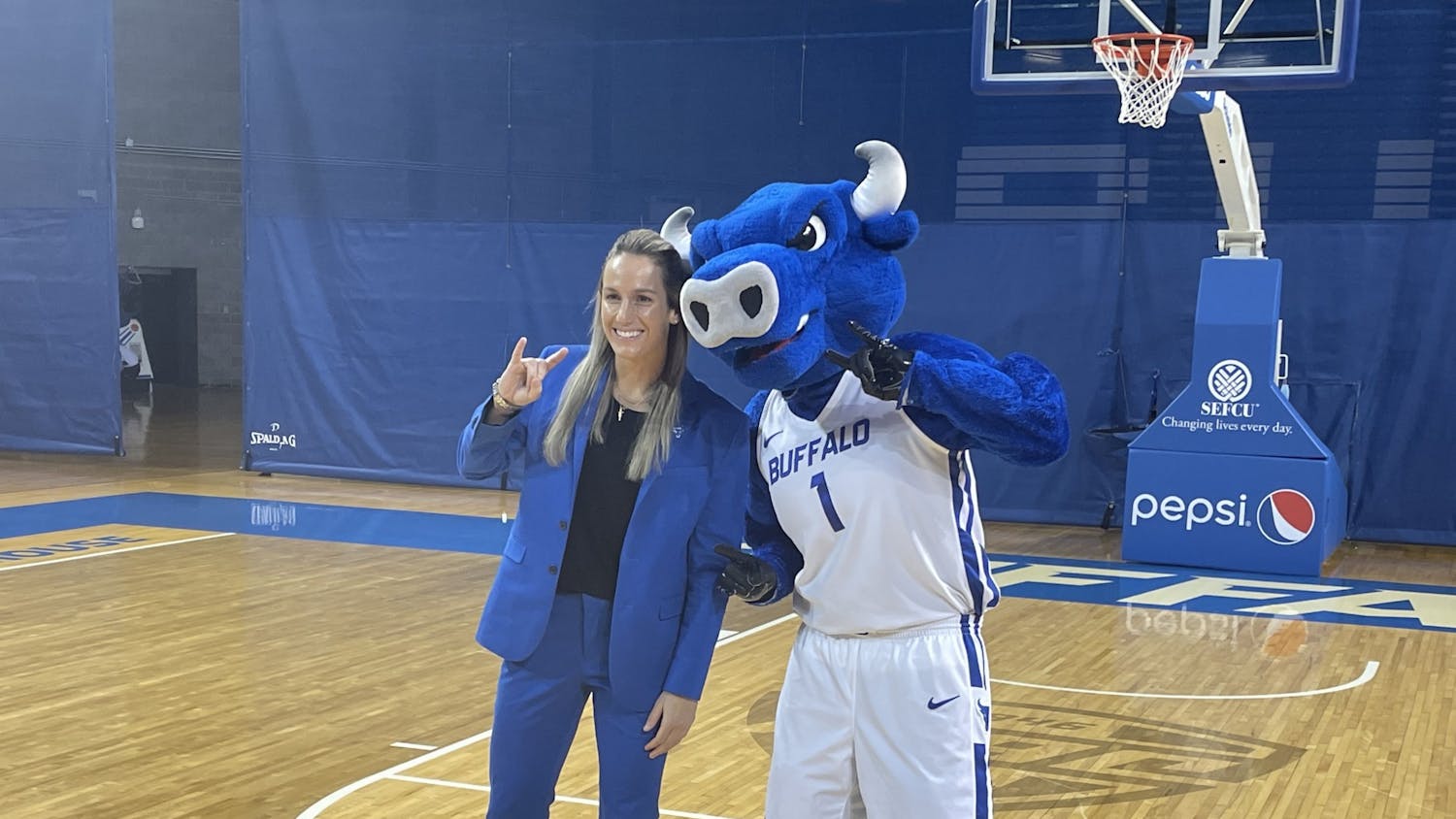With the lights off and headphones plugged in, the low hum of the monitors sing as projected live stream feeds illuminate the faces of UB’s Esports team
Buffalo Esports houses two levels of gameplay: club level and varsity level, which was elevated from club status in 2020. At the club level, members can participate in intercollegiate conferences and casual competition at UB for games like “Super Smash Bros.” and “Rainbow Six Siege.” UB has four varsity teams, each of which play a different game in the Esports Collegiate Conference — “Valorant,” “Rocket League,” League of Legends” and “Overwatch.”
The varsity team meets the criteria of a UB sports team, but without the same level of university support that a traditional sports team would receive. The team plays in UB-branded uniforms and participates in competitions against rival Mid-American Conference schools, but becoming a full-fledged UB sport has been an uphill battle.
“It’s just kind of like a sport, you know? Some people hit ruts in sports and they feel like they kind of plateaued a little bit,” sophomore psychology major Corey Fleck said. “If you still have fun with the game, keep trying.”
While Buffalo Esports is still in its infancy, UB Student Life has fought long and hard to pioneer the professionalization and destigmatization of university-level gaming.
“It’s the gravitas that they’re still trying to develop and earn,” Interim Esports Director Michael Yates said.
Students have been meeting on campus to game since the 2010s, with organizations like UB Smash Club accepting members with passion for the game, not only talent. These clubs now operate under the UB Student Gaming Association, which is overseen by Buffalo Esports.
“Now it’s a whole brand,” former UB Smash Club president and current player Matt Welch said. “We can now see a range of top-tier competitive teams entering — and in some cases dominating — the Esports Collegiate (ESC), to beginners who’ve never even heard of a K/D [kill/death] ratio.”
“Every team has its own identity,” Yates said, highlighting the vast gaming library UB boasts for students of all skill levels.
Finding one’s place among this whirlwind of rainbow keyboards, retro controllers and ergonomic chairs can seem overwhelming, with over 500 students linked to the esports nexus, over 2,400 users belonging to the Discord and 35 students playing for the varsity teams.
But students still say they feel that esports are under-advertised at UB.
“I didn’t even know UB had an esports team until my friend was the president, that’s the only reason I knew,” Decola said. “I always get messages all the time from people. They're like, ‘Oh, I didn’t even notice this existed.’ I think it’s a big problem.”
Yates echoed this sentiment during an interview with The Spectrum, “Esports is still the wild, wild west of ‘how do you navigate that right now?’”
Just like any other sport, esports needs widespread governance and regulation.
On April 13, 2019, the NCAA declined to incorporate esports into the collegiate sporting sphere. The absence of the renowned governing body leaves the Mid-American Conference (MAC) with no choice but to employ an LLC to oversee the participants.
Esports “is so multifaceted and huge,” Yates said.
The plethora of available games also poses another deterrent for the NCAA: standardization of rules and payment structures. Current college athletes have routine processes and clear contracts, a consistency that esports’ practice of personal branding and sponsorship obscures.

UB gamers experience this storm of sponsorship success and gaming victories on a daily basis, as they reach new heights with Buffalo Esports.
“I’d maybe go 2-2 on a best day, and then I would consistently make top eight and then I would consistently sometimes make top four, and now I’m a ranked player in Buffalo,” Fleck, a “Smash Bros.” aficionado, said. “I’m the fifth best player in Buffalo and then I’m the 11th best player in upstate New York.”
Both Fleck and Welch have individual sponsorships with 716 Esports and ZTDesports.
The “League of Legends” varsity team ranked eighth in the nation in spring 2021, and “for people who don’t know that space, that is amazing,” Yates said. Varsity “Overwatch” went undefeated in the SUNY league and placed fifth in the ESC League this season.
“Some players have gone on to high level if not professional level gaming, with sponsorships and money and coaching opportunities, like myself,” Welch said. “To have your matches streamed in front of hundreds if not thousands of people is just an incredible feeling.”
These accomplishments aren’t domestically-bound, either.
“Overwatch” players stayed up until “like four or five in the morning” to partake in a virtual Korean-U.S. tournament last fall, Yates said.
Yet other schools, like the University of Akron and Miami-Ohio, have more prolific programs, facilities and funding for esports.
“Plenty of schools out there have curriculum related to esports,” Yates said.
Certain colleges are also actively looking for coaches, social media engagement, announcers and more. “Call of Duty” players can even expect “full-ride scholarships,” at some schools, according to Decola. Some schools even host esports in their honors college.
Players like Tyler Parenti, president of the UB Smash Club, say they want UB to provide adequate funding for esports.
“The biggest thing is finding money to get our name in. That was the original reason we left [the Student Association],” Parenti said.“We put in a lot of time, and I feel like we do get overlooked a lot. We put in at least 20 hours a week… and we don’t get the perks that athletes do,” Decola said, echoing that sentiment.
The wavering university backing and lack of media coverage further solidifies that these players are overlooked.
“Our Monday match didn’t end up getting broadcast. That was probably the biggest match of the season,” Ethan Peeler, the varsity “Overwatch” captain, said.
But the players are hopeful that these issues will be resolved by the time the “LevelUp” gaming lounge located across from Lockwood Library opens later this month.
“We share the [Hadley gaming] lounge every week, which is kind of hectic at times, because we’re all screaming while we’re playing video games,” Decola said. “So it’s gonna be good to have an extra space for us to branch out.”
Yates says that Buffalo Esports has engaged in talks with Microsoft to help establish analytical standards, while leveraging potential esports career opportunities.
The environment esports fosters for students is at the heart of everything Buffalo Esports does.
“We want competition. We also want community,” Yates said.
As soon as one steps into UB’s gaming areas, they can feel the pride and warmth that comes with being a part of this community.
“Anybody and everyone is welcome,” Parenti said.
Sophie McNally is an assistant sports editor and can be reached at sophie.mcnally@ubspectrum.com
Jack Pocari is the senior news editor and can be reached at jack.pocari@ubspectrum.com

Jack Porcari is a senior news/features editor at The Spectrum. He is a political science major with a minor in journalism. Aside from writing and editing, he enjoys playing piano, flow arts, reptiles and activism.

Sophie McNally is an assistant sports editor at The Spectrum. She is a history major studying abroad for a year from Newcastle University in the UK. In her spare time, she can be found blasting The 1975 or Taylor Swift and rowing on a random river at 5 a.m.





